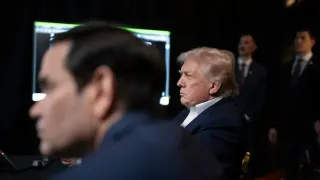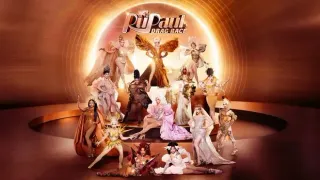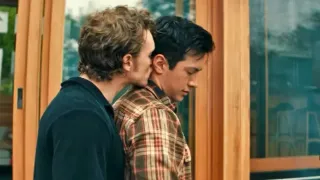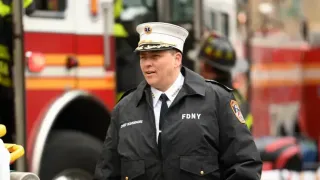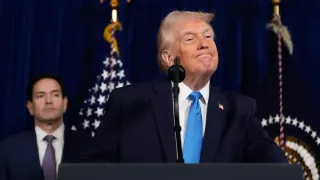October 10, 2014
Little Common Ground in Florida Governor Debate
Jason St. Amand READ TIME: 3 MIN.
Republican Gov. Rick Scott and Republican-turned-Democrat former Gov. Charlie Crist agreed during a debate Friday that Ebola would be bad for Florida - and they disagreed about nearly everything else.
In a contentious debate that reflected the negative tone of the campaign, Scott and Crist took opposite sides on issues including health care, the minimum wage, Cuba policy, gay marriage and medical marijuana.
No matter the question, Scott repeatedly pointed out that 832,000 jobs were lost during Crist's term and that a bill he signed as governor allowed universities to raise tuition by up to 15 percent annually. Scott also called Crist a do-nothing governor.
"He'll talk a big game, but there is no action," Scott said during the debate, hosted by Spanish-language station Telemundo 51. The debate was to be broadcast Friday night in Spanish and will be important for a critical constituency in Florida. Latinos make up 14.4 percent of registered voters, with nearly 40 percent registered as Democrats and 27 percent as Republicans.
Crist attacked Scott and said the governor has hurt the middle class, doesn't believe in climate change, and can't be trusted after running a hospital chain that paid that $1.7 billion in fines for Medicare fraud.
"Can you believe him? Can you trust him? Who knows?" Crist said.
Crist also noted that Scott invoked his Fifth Amendment rights against self-incrimination during a civil lawsuit involving the hospital chain, Columbia/HCA.
Scott used the opportunity to point out that Crist took campaign contributions from Scott Rothstein, who was later convicted of running a Ponzi scheme, and had ties to Jim Greer, the former state GOP chairman who pleaded guilty to stealing money from the party.
"Here's the big difference between Charlie and me. I'll take responsibility and Charlie never will," Scott said. "I will take responsibility for the actions while I was a CEO. In contrast, Charlie has never taken responsibility for anything."
Crist said that just as he can't be blamed for the state's downturn during a global recession, Scott can't take credit for Florida's recovery as the economy improves nationwide.
Crist tried to make Scott, a multimillionaire who spent $75 million of his and his family's money in campaigning four years ago, seem out of touch.
"People are suffering, and they're struggling," Crist said. "For people who maybe have a private jet, like the governor does, and a mansion on the waterfront, things seem OK."
The two came close to an agreement on gay marriage, with both saying the courts will decide whether Florida's ban is constitutional. But Scott said he supports traditional marriage while Crist said he believes government shouldn't interfere with personal decisions.
On the issue of minimum wage, Crist supports a raise to $10.10 an hour, which Scott opposes.
"If we raise the minimum wage the way Charlie wants to do it, we would lose 500,000 jobs," Scott said.
Crist said a raise would help the economy.
"People need it," Crist said. "If more people have more money in their pocket, they have more disposable income to go shopping."
The candidates also took opposing sides on a ballot question asking voters to legalize medical marijuana. Crist supports the idea, mentioning that his sister has brain cancer and that marijuana is an alternative to powerful pain pills. Scott opposes it and cited a history of alcoholism in his family.
"I've watched family members deal with drug abuse, so it scares the living daylights out of me," Scott said.
In another disagreement, Crist said he supports lifting the Cuban embargo. He said that it hasn't worked and that the U.S. needs a new approach, while Scott said it should be kept in place.
"I believe in the embargo and here's why: The Castro brothers are terrorists," Scott said, referring to Cuban President Raul Castro and brother Fidel.
